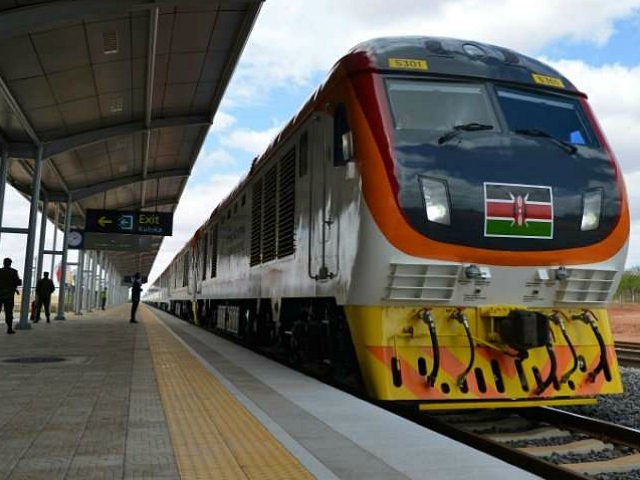Kenya’s The Standard newspaper, which previously exposed outrageous discrimination on the part of Chinese workers in the country towards native Kenyans, reported on Sunday that Kenya has let in at least 5,000 Chinese workers to take jobs Kenyans could easily do — and an untold number of others illicitly using tourist visas to take Kenyan jobs.
The Chinese are in the country to build the Standard Gauge Railway (SGR), the largest infrastructure project in Kenya in the last half-century. It is one of the feature projects of “One Belt, One Road” (OBOR), Chinese Communist Party leader Xi Jinping’s global project to get China to build railways, roads, and ports all around the world and later seize them, giving China control of nearly all the world’s transportation.
According to Reuters, the SGR “is eventually expected to connect Uganda, Rwanda, Burundi, Democratic Republic of Congo, South Sudan and Ethiopia to Mombasa so the Indian Ocean port can act as a gateway to East Africa for trade with China and other nations.”
China sold the project to Kenya — like it has many projects to African nations — by arguing that the railway will make transportation and commerce easier for Kenyans and the project itself would create thousands of local jobs. In practice, however, the Chinese have imported thousands of workers to Kenya to take those jobs and kept Kenyans employed in the project away from any skilled labor. According to the nation’s The Standard, the Chinese do not translate instruction manuals or guides, ensuring that the railway cannot function without a Chinese worker running it.
While The Standard exposed the racism concerns surrounding the project last week, on Sunday it revealed the extent of the invasion of Chinese workers into the country, raising serious concerns that Kenya’s immigration authorities have been compromised and are allowing the Chinese government to override all sorts of regulations. The Standard report found that, on the record, Kenya has welcomed 4,954 Chinese citizens to the country to work on the SGR.
“Insiders said besides the official numbers that have applied for work permits, there are hundreds of others behind the walls working using tourist visas who fly back home every six months for a short break, before jetting back in to pick up where they left,” the newspaper notes. Reporters were unable to find a concrete number of Chinese individuals on “tourist” visas in town to illegally work on the project.
Asked to clarify how many Chinese citizens were working on tourist visas, Immigration Principal Secretary General Gordon Kihalangwa told The Standard that he was working on verifying the number but “told us that it would be premature to preempt the findings of that process.”
The Standard fears that the Kenyan government is intimidating immigration officials out of keeping track of “tourists” illegally doing jobs that would have rightfully belonged to Kenyans, as “they fear being highlighted as those frustrating the project in what has seen the Chinese staff dubbed ‘untouchables’ among immigration officials.”
Typically, the Kenyan government charges countries a 400,000-shilling (nearly $4,000) fee per foreign worker. The Standard found that the government of President Uhuru Kenyatta waived this fee, leaving $20 million on the table.
Foreign workers also cost more to hire than Kenyans, leading to protests from Kenya Railways, the local corporation partnered with China on the project. The head of Kenya Railways, Atanas Maina, told the newspaper he was told the government would hire three Kenyans for every Chinese foreign worker, a promise they have not kept, even not counting the “tourist” workers.
“Expatriate staff cost 2.5 times more than local staff in line with international practice,” Maina noted.
Kenya is also paying a billion shillings (about $10 million) a month in lodging and amenities for senior Chinese workers, the newspaper alleges.
Some in the opposition have begun to call for investigations into how Kenya’s immigration services function. MP Vincent Kemosi of the opposition Ford-K party told Kenya’s The Star on Monday that he suspected corruption had hampered the functioning of immigration authorities and “the department has inexplicably given work permits to Chinese nationals for SGR jobs that can aptly be done by Kenyans.”
Yet the immigration issue has taken a backseat to last week’s bombshell The Standard report, revealing that Chinese workers have essentially imposed an apartheid system on Kenyan workers at the SGR.
“Racism is so real here. There is an unwritten rule of where you need to sit. You cannot just join the Chinese table,” according to one Kenyan worker. “You cannot board a van that drops us in the evening even if there’s only one Chinese on board. You will have to wait.”
Kenyan government spokesman Eric Kiraithe responded to the report by blaming Kenyans for the racism and telling them to work harder. “I am not saying any worker should be discriminated and humiliated in the work place but we must all appreciate that the operations of a modern train is a profession that calls for military standard discipline,” he said by way of explanation.
The Chinese government has not responded directly to the report’s claims, instead stating that, generally, criticism that OBOR is leading to colonialism resurfacing in Africa and is triggering political chaos around the world is “irresponsible.”


COMMENTS
Please let us know if you're having issues with commenting.